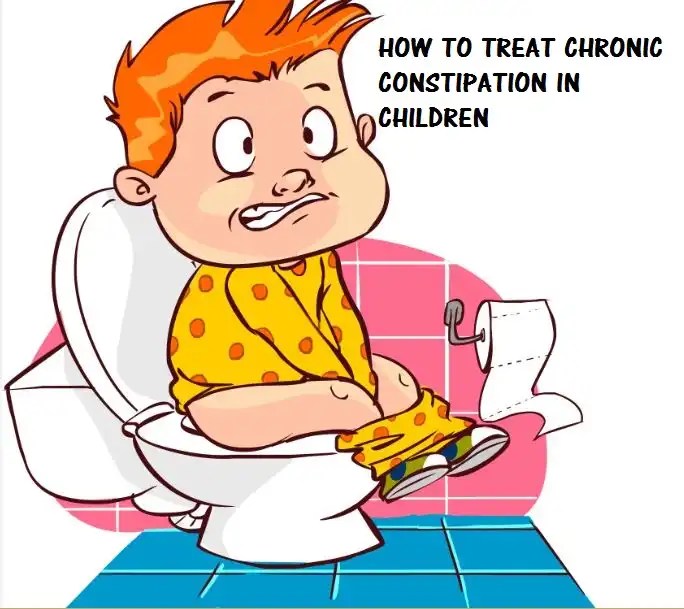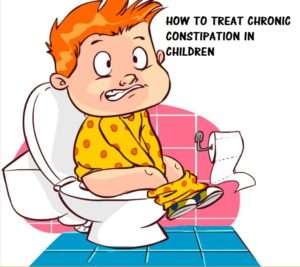
What is chronic constipation in children?
The definition of chronic constipation differs from one person to another. This is because constipation has to do with the frequency of bowel movement and different folks have different ideas about the number of times which they consider normal. While some consider it chronic constipation if they do not have a bowel movement at least three times in a week, others see it as having difficulty in passing out stools or straining to pass out stools. It is generally accepted that having difficulty in or straining to pass out stools when you feel the need is constipation.

Constipation is a condition that disturbs both children and adults. Constipation in children can be quite painful to observe especially as a parent as one can literally see the difficulty in passing out stools in the child’s eyes. Chronic constipation in children generally begins when the child passes out stools less than three times in a week. This is still controversial and if you observe your child having difficulty passing out stools and at the same time complaining of aching stomach then you might want to start checking for other signs of constipation.
Chronic constipation – what’s normal and what’s Abnormal?
There is quite some myth about chronic constipation in children that can easily be confused with facts. Few of the myths are listed below and you should take them seriously as they are not facts.
#1Myth: if your child doesn’t have at least one bowel movement in a day, then he’s suffering from constipation. It’s not true. Generally, constipation should only be suspected if a bowel movement is less than three times in a week.
#2Myth: toxins accumulate in the intestines if your baby is having an infrequent bowel movement. This is not true. Research has shown that there’s actually no evidence of accumulation of toxins in a child’s intestines due to an infrequent bowel movement.
#3myth: your child’s bowel movement should increase with age. This is not true. Research has shown that the frequency of bowel movement actually decreases as we grow older.
#4Myth: if you are feeding your child right and exercising right, he will not suffer chronic constipation. Actually, research has shown that constipation is not only caused by diet. It can also be caused by psychological issues such as a child or sexual abuse, the death of parents and so on. Chronic constipation in children can also be caused by severe depression and other underlying medical problems.
Causes of Chronic Constipation In Children
Normally after eating, the food passes through our digestive tracts. The intestines absorb nutrients and water from the food as it passes through the digestive tract until stools are formed.
Since constipation is always linked to the difficulty in passing out of stools or the passing out of hard stools, it is believed that in cases of constipation, the intestines absorb more water from the food passing through the digestive tract, hence resulting in the formation of hard stony stools which is difficult to pass out of the body. This whole process can actually be linked to the brain since it actually controls the amount of water to be absorbed from foods in the intestines by directly controlling the hormones responsible for the process. More research is still be carried out to determine the actual causes of chronic constipation, especially in infants.
Symptoms of chronic constipation in children
Constant Changing Posture
Changing of posture is often a symptom of constipation in children. Most nursing mothers or caretakers often mistake and interpret this symptom as the child trying to have a bowel movement, but actually, the child may be constipated. Changing of posture may include clenching of buttock muscles, unusual dance like movements or standing on tiptoes and rocking back and forth.
Excessive straining in passing out stools
If your child is straining before being able to pass out stools, the child may actually be constipated. This should not be confused with actual difficulty in making the stools to come out. That can happen at one time or the other. When the child actually finds it difficult to make the stool come out after spending a lot of time sitting, then constipation may be the cause.
Hard or stony stools
Passing out of hard stools is also another symptom of chronic constipation in children. Especially when this comes out in minute quantity after spending a lot of time sitting on the bowl.
Feeling Incomplete Evacuation
If your child ever complains to you that it felt like all did not come out after having a bowel movement then you should suspect constipation. A symptom of constipation is the feeling of incomplete evacuation after having a bowel movement.
Feeling An Obstruction
If you suspect constipation in your child, then you should ask him if he feels any obstruction in his stomach. This may be in form of a pain at a point or a feeling of stools being blocked at a particular point in the stomach.
Infrequency in Passing Out Stools
Another symptom of constipation you can easily identify in your child is the frequency of stools. If your child is passing out stools less than three times in a week and finding it difficult doing so, you should start treatment for constipation immediately or at least start suspecting it.
Feeling Bloated
If your child is feeling bloated and at the same time passing out stools Infrequently and being unable to eat because he feels filled, you should start treatment for constipation.
Urinary Incontinence
As a result of the bloated stomach, the trapped feces may press against the child’s urinary tract resulting in pain when passing out urine. This pressing of the stomach on the urinary tract may also result in the daytime or nighttime bedwetting called urinary incontinence.
Pain in The Lower Abdomen
Chronic constipation often results in severe pain in the lower abdomen which often results in discomfort. The pain will come in excruciating levels and then disappear for a few minutes or longer and then return again. It moves from one part of the stomach to the other and should not be confused with other abdominal pains which may be caused by other health issues. Generally, if your child is feeling bloated, unable to eat and having severe stomach cramps, then he may be suffering from chronic constipation.
How To Prevent Chronic Constipation In Children
Diet
Giving your child a non-constipating diet is the best way to prevent chronic constipation. If constipation even ever occurs in your child, the diet is still the best way to relieve it.
Generally, for babies below 12 months who are still Breastfeeding, it is harder for them to become constipated. However, always make sure the child takes in enough fluid in form of breast milk and when making a formula for your baby, ensure you add enough water to it.
For children who are 12 months and older, constipation can easily become a problem and as a parent or a caretaker, you should take active steps to prevent it as much as possible.
Ensure your child is taking in enough fluids especially during hot weather as the body tends to lose more water from the body during this period which often results in the hardening of stools in the intestines.
Add high fiber to your child’s diets. Foods containing Fibre helps to soften your child’s stools and facilitate more bowel movement. Always ensure your child gets a cup of fruit or vegetables every day as both are quite rich in fiber and guaranteed to help facilitate regular bowel movement.
Limit low fiber foods such as cheese, cream, meat, milk etc in your child’s meal and incorporate more foods like brown rice, beans bran flakes and so on which are rich in fiber in your child’s meal.
Toilet training
Most children actually start suffering from constipation during toilet training. This may be due to the fact that most children hate the inconvenience of this new aspect of their lives which they must take care of and some may feel shy using a public toilet. When your child starts toilet training, always
Ensure he goes to the toilet when he feels the urge. Most children often ignore the urge to use the bow even when they are pressed. The urge will go away on its own within a few minutes and the child will become comfortable again but this can result in the loss of more water from the stools which can cause the stools to become more hardened and more difficult to pass out.
You can make a toilet routine for your child each day to make everything easier for him. Urges for bowel movement often occurs a few hours after a meal. You may decide to set a time, maybe a few minutes or hours after meals for the child to use the toilet. This way he gets to get rid of the waste before it hardens in the intestines.
Exercise
Set good lifestyle examples for your kids. A good example routine will go a long way in keeping constipation at bay in your family.Constipation might actually be a warning sign
Chronic constipation in your child may actually be a warning sign of a more serious underlying health problem and you should watch for the following signs whenever constipation occurs. If you observe any of the following symptoms coupled with constipation, you should contact your doctor immediately
- Constipation that lasts more than 2 or three weeks
- Mild diarrhea lasting more than a week
- Black Stools
- Unexplained urges to have bowel movement but nothing coming out when you sit on the bowl
- Bloody diarrhea
- Severe diarrhea lasting more than a week
How To Treat Constipation In Children
Simple Home Remedies for Chronic Constipation in Children
Laxatives
Laxatives maybe foods, medicines or other substances which soften the stool and make it easier for it to pass out from the colon. Laxatives should be used with care and you should only get ones prescribed by the doctor, avoid over-the-counter drugs as much as possible. You should also care about the dosage of laxatives you give to your child. Excessive dosage can lead to frequent watery stools and dehydration.
Unplugging the colon
Sometimes what you thought to be chronic constipation in your child may actually be due to colon obstruction and all that is often needed to bring relief is cleaning of the colon. You can easily clear the colon of any obstruction either using polyethylene glycol or enemas. Only use polyethylene glycol mixed in just the right amount of water to help clean your child’s colon. An enema can be very uncomfortable for your child and it should only be used as a last resort.
Exercise
Exercise is quite important in the treatment of chronic constipation. It helps to facilitate your child’s bowel movement. It can help in reducing the discomfort that comes with constipation. If your child is suffering from constipation, let him lie on his back and gently stretch his legs back until his knees touch his stomach. This will work the abdominal muscles and help in making them more relaxed for bowel movements. You can also peddle the child’s legs like riding a bicycle or massage his stomach to help loosen abdominal muscles.
Change in diet
You should consider a change in your child’s diet if he’s suffering from constipation. Foods low in Fibre often contribute to constipation and should be reduced in your child’s diet. Foods like fruits, vegetables, lemon juice, broccoli and other high fiber foods should be included in your child’s diet.
When To See Your Doctor
Constipation in children is not a health emergency and shouldn’t cause you be alarm as it can be treated at home following the steps are given above. However, if you observe the following symptoms in your child, you should seek medical help immediately
- Vomiting
- Fever
- Weigh loss
- Abdominal pain
- Frequent blood in stool
- Painful tears around the anus.
Constipation like all other health issues is better prevented than cured. Maintaining a healthy lifestyle of exercise, a diet rich in fires and good toilet habits is the best way to keep constipation out of your child’s life.



